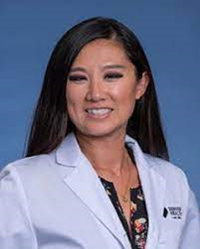Pathways
At the start of their second year, every resident selects one of five career “Pathways”. These are deep educational dives into a topic adjacent to clinical medicine. They round out your training in a way that you find meaningful and that you think will help to prepare you for your future career in medicine. This is in addition to the track each resident matches into at the beginning of residency and encourages further specialization of training. The five Pathways include:
- Global Health
- Health Equity, Advocacy & Policy
- Medical Education
- Medical Leaders
- Research & Investigation
Medical Educator Pathway
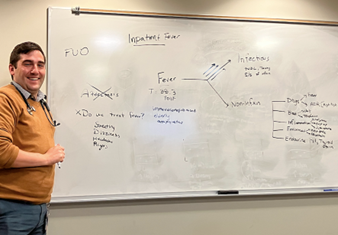
Welcome to the Medical Educator Pathway! This pathway is designed to give residents the knowledge and skills to succeed as educators during residency and their careers beyond.
Who should consider the Medical Educator Pathway?
All residents are welcome to join our pathway, including residents in our Categorical, Hospitalist, Primary Care Tracks and Med-Peds Program. When residents are asked why they joined our pathway, generally they have one of the following interests:
- To improve educator skills as residents
- To pursue a career in medical education
- To be better teachers for patients
Why choose the Medical Educator Pathway?
- Session structure
- Our interns, R2s and R3s are divided into separate sessions, which allows our content to build on itself over ten unique Wednesday education sessions for a total of 40 hours of content per resident.
- Pathway sessions include didactic lectures, workshops, and hands-on practice to build teaching skills in a supportive environment
- Session content
- Curriculum designed to cover the essential, evidence-based med ed content that is appropriate for your stage in training:
- For PGY1s, we focus on basic teaching skills.
- For PGY2s, we help you to be an excellent resident teacher
- For PGY3s, we cover our attending tool kit of skills for a successful career in medical education.
- Curriculum designed to cover the essential, evidence-based med ed content that is appropriate for your stage in training:
- Educational speakers and leaders
- Speakers come from all training sites, a variety of IM specialties, different backgrounds and different stages in their careers.
- We invite the best educators to share advice and provide meaningful mentorship opportunities.
- Teaching opportunities
- Our longitudinal Chalk Talk Project integrates small lecture skills and curriculum development to give residents real-world teaching opportunities with feedback. Through this project, we created a repository of over 100 talks that residents can use for teaching.
- Teaching at the CU School of Medicine during pathway time.
- Connections to optional opportunities for teaching, creating curriculum and creating educational scholarship across campus.
Learn more about the Medical Educator Pathway curriculum here!
Pathway Leadership
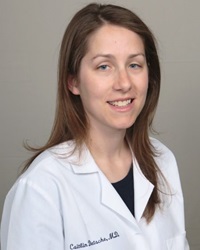
Caitlin Dietsche, MD is an academic hospitalist at the University of Colorado. She attended medical school and residency at the Thomas Jefferson University Hospital. She is the Director of the Medical Educator Pathway and the Medicine Wards Service Line.
Global Health Pathway
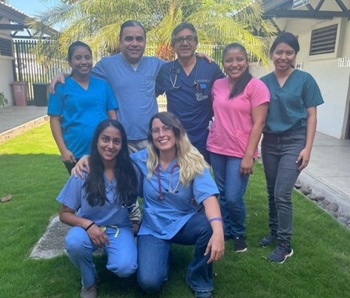 Welcome to the Global Health Pathway! Through an innovative curriculum of individualized training and mentorship, we are dedicated to developing physician leaders who will transform the science of medicine and provide compassionate care to their patients that transcends national boundaries.
Welcome to the Global Health Pathway! Through an innovative curriculum of individualized training and mentorship, we are dedicated to developing physician leaders who will transform the science of medicine and provide compassionate care to their patients that transcends national boundaries.
Why should I choose the Global Health Pathway?
The goal of the Global Health Pathway is to train residents to
identify and address the impact of economic, societal, cultural, and
environmental factors on health, as well as to train future leaders in global
health through scholarship, clinical practice, and community engagement. The
pathway emphasizes longitudinal learning, as well as a sustained presence in
the community and abroad.
The didactic component of this training program includes
sessions via the Wednesday Education Sessions (WES) and an on-site global
health learning experience. The
curriculum includes case-based lectures on common diseases encountered while
abroad, POCUS sessions, and training in ethical, social, and cultural
challenges. Residents
who are part of the pathway have the opportunity to spend rotations
abroad at one of the main GHP sites including Zimbabwe,
Guatemala, India, the Philippines, and Nepal.
Learn more about the Global Health Pathway curriculum here!
Pathway Leadership
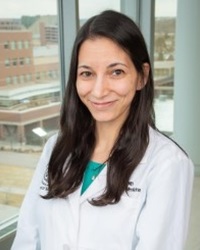
Reem Hanna, MD went to the University of Pittsburgh for medical school and then completed residency at the University of Pittsburgh Medical Education Program. She currently is an Assistant Professor in the Division of Hospital Medicine at the University of Colorado and co-directs the Global Health pathway for the Internal Medicine Residency Program.
Health Equity, Advocacy, and Policy Pathway
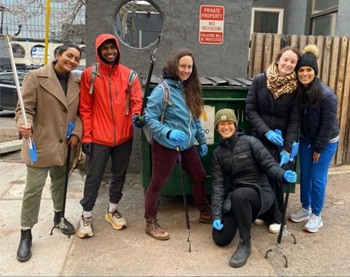 Welcome to the Health Equity, Advocacy, and Policy Pathway! In this pathway, the curriculum is designed to help residents explore how the social determinants of health, health-related social needs, and local, regional, and national policies affect the health of individual patients and populations. The curriculum is a hybrid of didactic and experiential learning.
Welcome to the Health Equity, Advocacy, and Policy Pathway! In this pathway, the curriculum is designed to help residents explore how the social determinants of health, health-related social needs, and local, regional, and national policies affect the health of individual patients and populations. The curriculum is a hybrid of didactic and experiential learning.
Why should I choose the Health Equity, Advocacy, and Policy Pathway?
The pathway has a specialized curriculum that addresses topics such as local population health and the societal and social factors that influence the health of our patients. The curriculum adapts annually based on the active needs of the community and residency, hot topics, etc. The aims of the pathway are to:
- Synthesize how social, political and economic factors contribute to health disparities
- Educate residents on strategies for addressing social determinants of health and health related social needs in clinical practice
- Understand the value of community partnerships in advancing health equity
- Recognize the importance of interacting with state/regional government on issues of health equity
- Develop strategies for the delivery of culturally humble and trauma-informed care
Learn more about the Health Equity, Advocacy, and Policy Curriculum here
Pathway Leadership
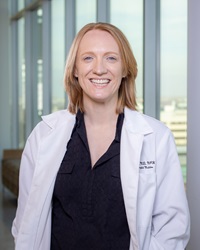
Erin Bredenberg, MD is a hospital medicine physician and addiction medicine consult provider at the University of Colorado hospital. She is interested in novel strategies to improve care for vulnerable populations including people experiencing homelessness and those with substance use disorders. Specifically, she is interested in using the opportunity of an acute care hospitalization to engage patients with necessary care they might not otherwise receive in an outpatient setting, such as hepatitis C screening and treatment or linkage to community resources.
Jia Liu, MD, MHS completed medical school at the University of Pittsburgh School of Medicine and residency at Boston Medical Center. She is currently a hospitalist at the Rocky Mountain Regional VA Medical Center and co-directs the Health Equity Pathway.
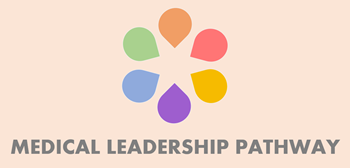
Medical Leadership Pathway
Welcome to the Medical Leadership Pathway (MLP)! The purpose of the MLP is to train good healthcare leaders. We specify that our aim is to make “good” leaders – leaders who are not only operationally effective (good at leadership) but who also have sound moral judgment (good people). We prepare residents for lifelong careers as high-level organizational leaders: health system executives, community advocates, policymakers, andheads of academic divisions and departments. The curriculum is founded on the theoretical framework of Transformational Leadership, a philosophy that leaders should inspire followers to move beyond their perceived limits through charisma, vision, and emotional intelligence. We believe that this framework is the most apt for healthcare leaders since it prioritizes moral leadership, emotions, values, ethics, standards, and long-term goals.
Why should I choose the Medical Leaders Pathway?
The MLP is a 2-year training program for PGY-2 and PGY-3 internal medicine residents who seek careers as both clinicians and healthcare leaders. The MLP is open to residents who join the Categorical, Primary Care and Hospitalist tracks and is designed for residents who possess excellent potential to become executive-level leaders early in their careers and are interested in advanced leadership training during residency.
Six competencies comprise the curriculum, founded in Transformational Leadership:
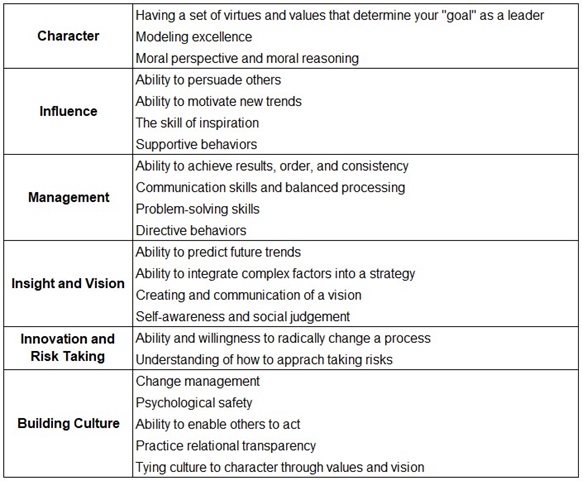
The standard MLP experience involves eight half-day didactic sessions in which specific skills related to each competency are developed. Residents wishing to pursue an augmented MLP experience may elect to complete an MLP project. Projects include four personal leadership coaching sessions with MLP faculty or a mentor in a relevant local leadership position.
Residents in the MLP will also be invited to MLP Dinner series in which a leadership topic is discussed, sometimes with a guest, over dinner at faculty’s home if feasible. Prior guests have included C-suite leadership, representatives from state government, leaders from academia and national organizations.
Learn more about the MLP Curriculum here!
Pathway Leadership
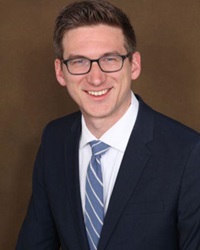
Samuel Porter, MD went to Columbia University College of Physicians and Surgeons where he focused on health systems improvement in he Columbia-Bassett track. He did his internship, residency, and chief residency in quality and safety at the University of Colorado. He worked in a healthcare delivery startup, and now is involved in quality improvement projects and health systems education with the Division of Hospital Medicine at the University of Colorado.
Research and Investigation Pathway
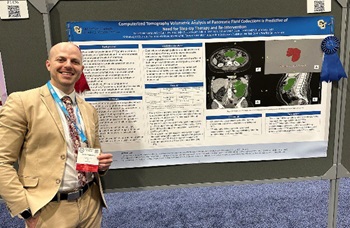 Welcome to the Research and Investigation Pathway! Our goal is to teach the core competencies needed to develop a solid foundation in research and investigative practice.
Welcome to the Research and Investigation Pathway! Our goal is to teach the core competencies needed to develop a solid foundation in research and investigative practice.
Why should I choose the Research & Investigation Pathway?
Our trainees come in with varying degrees of research experience and interest. Some residents have extensive research experience and know that research will be an integral component of their future careers. Many other residents are considering research as part of their career future, but may not have participated in significant research opportunities before residency or have a full understanding of the broad array of research opportunities available in medicine. On the other hand, other residents detest research. Regardless of where a trainee falls, this pathway is for any trainee interested in making research a part of the medical career.
In order to provide an overview of research options a resident could consider and to provide education in the basics of research, our research pathway curriculum includes:
- Longitudinal didactic series reviewing various research disciplines
- “Meet the Professor” lectures from faculty actively pursuing research careers
- Small-group workshops on writing research abstracts and grant applications
- Senior resident research presentations
- Fellowship preparation
- Career mentoring sessions
- Administrative leadership career paths
- Wellness programming
- Biopharmaceutical company start-up
- Management and careers in industry
Residents in the research pathway are paired with an appropriate mentor and complete 1-2 months of research as part of their program curriculum.
Learn more about the Research and Investigation Pathway curriculum here!
Pathway Leadership
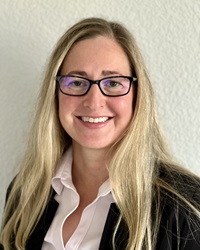
Lisa Davis, MD, MSCS, grew up in a rural town in Arkansas. She completed her undergraduate degree at Brigham Young University and her medical degree from the University of Colorado. She completed her internship, residency and Rheumatology research fellowship at the University of Colorado. She joined the faculty at Denver Health Medical Center in 2011, where she practices Rheumatology. Her areas of research include adverse drug events, outcomes research, and health services research. She joined the residency program as an Associate Program Director in 2016, and works with the research track and categorical residents. She has a son and a daughter and enjoys cooking, cycling, hiking, and most outdoor sports.
